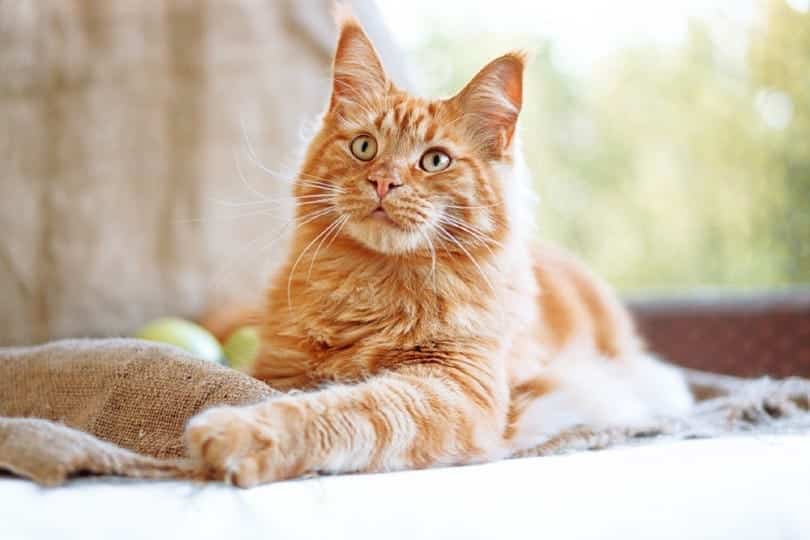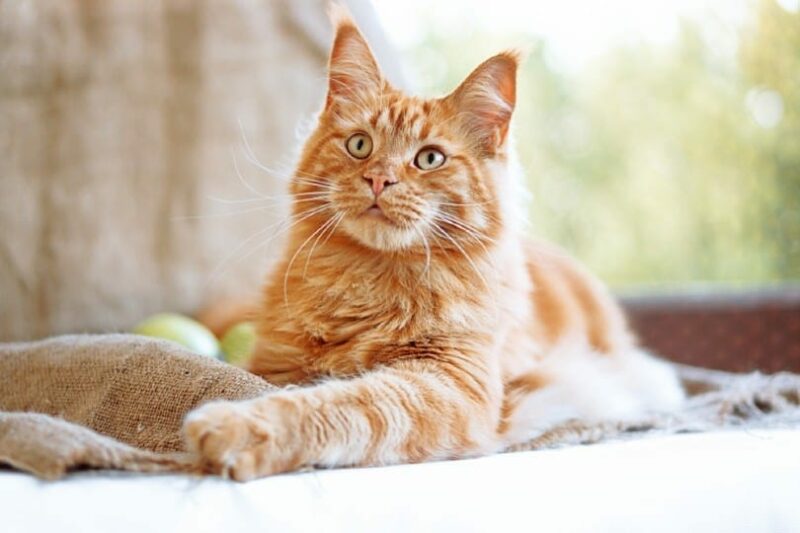| Height: | 30–40 inches |
| Weight: | 12–22 pounds |
| Lifespan: | 9–15 years |
| Colors: | Solid, smokey, bi-colored, tabby, tortoiseshell, white, black, blue, red, brown, silver |
| Suitable for: | Families, seniors, singles |
| Temperament: | Sweet, gentle, affectionate, adaptable, athletic |
The Maine Coon is a breed known for its large size and equally huge personality. They hail from Maine, as the name implies, and were known as a popular mousing cats on farms, ships, and homes. They are highly affectionate cats that love to be around humans, and their loving personality is what makes them so revered among cat owners.
Maine Coons are one of the most popular breeds in the United States, ranking fifth in 2016, according to the Cat Fanciers Association. If you want to know more about this large and loving breed, read on for an in-depth look at the gorgeous Maine Coon.

Maine Coon Kittens — Before You Welcome One Into Your Family…
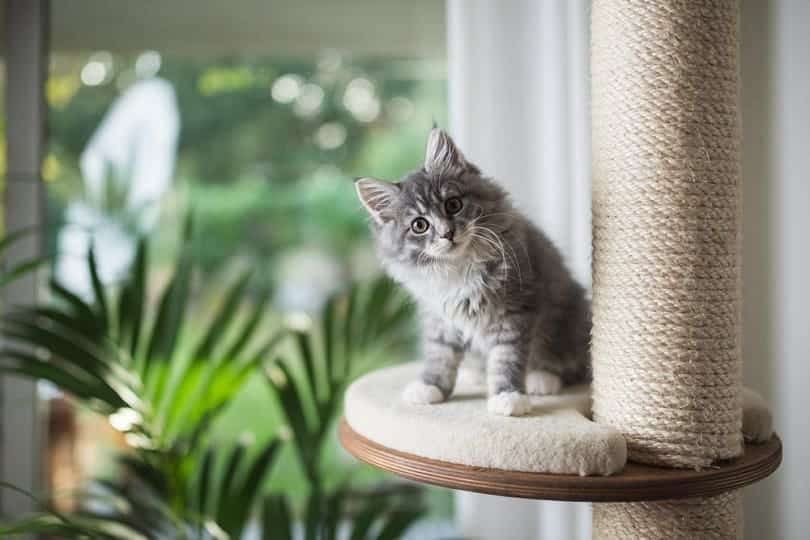
Before you bring home a Maine Coon, it’s vital to consider the cat’s size. These cats are one of the largest domestic breeds—some can tip the scales at 20 pounds—and can easily knock over everything in your home. They are also highly affectionate cats that get attached to their owners, so if you are looking for a traditional independent, happy-to-be-alone cat, the Maine Coon is probably not it.
In fact, these cats are often referred to as the “dogs of the cat world” due to their sweet nature and affectionate temperament. They are known to follow their owners around the home seeking attention the same way dogs do, and they enjoy an interactive play session just as much as any dog and ideally should get one every day. The Maine Coon is a bigger responsibility than most other breeds, so it is a decision that should not be taken lightly.

3 Little-Known Facts About the Maine Coon
1. They almost went extinct
Due to their popularity in the US and the world, it may be difficult to believe that the Maine Coon faced extinction in the early 1950s and was even declared extinct by some due to their scarcity. This was thankfully an exaggeration, but their numbers were still relatively low, and there were very few Maine Coon breeders left. By the early 1970s, there were only around 20 Maine Coons registered in the US! Luckily, thanks to dedicated breeders and cat show winnings, the Maine Coon was brought back from the brink.
2. They are the oldest breed native to the U.S.
There are wild and wonderful stories about the origins of the Maine Coon, some of which involve Maine Coon and raccoon pairings! While it is difficult to pinpoint the exact origins of the breed, we know that they originated in Maine and are one of the oldest breeds native to the U.S. The breed likely came about when European sailors arrived in the U.S. with long-haired cats, which were then crossed with local short-haired breeds.
3. They love water
While most cats are not interested in swimming, Maine Coons love water! They have a thick, water-resistant coat that keeps them warm in the water, and they are strong swimmers and will usually jump at the chance for a dip.
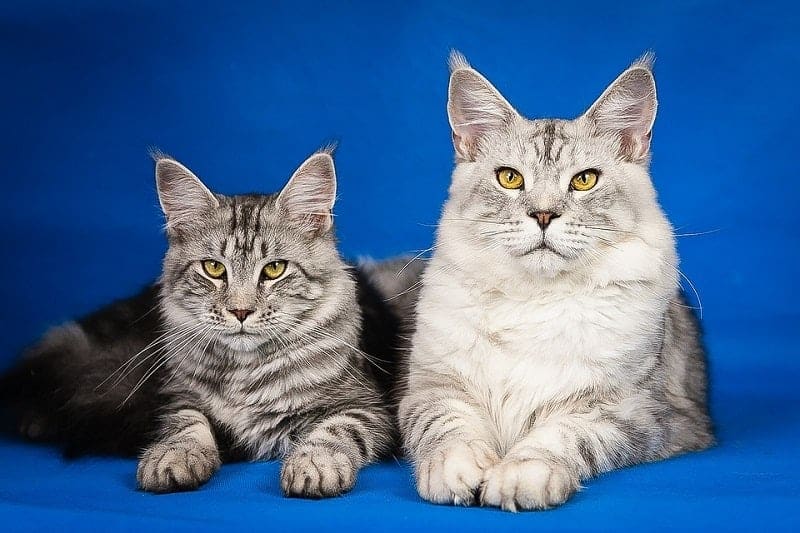

Temperament & Intelligence of the Maine Coon
The Maine Coon is one of the most affectionate and loving of all cat breeds, and they thrive off of human contact. Indeed, these cats can often be seen following their owners around the home, similar to dogs, and are happiest when with their owners. However, they aren’t needy or clingy and are independent animals that are happy to do their own thing. They love affection but are happy to be quiet observers of your activities in the background.
Maine Coons are highly intelligent animals and expert ratters. If you have a rodent problem in your home, the Maine Coon will swiftly take care of the issue. If you don’t have rats around, they are happy to engage in games with toys that keep this hunting instinct satisfied, and they love interactive play sessions with their owners that include chasing, fetching, and pouncing. They stay playful and kitten-like well into adulthood, and males are well-known for their playful temperaments.
Are These Cats Good for Families?
Maine Coons are highly social and friendly animals that make great family pets. They are loving and affectionate with just about everyone, including children, and are happy to be picked up, petted, and cuddled frequently. Although these cats are affectionate, they are not typical lap cats and prefer to be close to their owners rather than on top of them.
Does This Breed Get Along With Other Pets?
Maine Coons are exceptionally pet-friendly and get along great with other cats and dogs. Like most domestic cats, they have a strong prey drive and are exceptional ratters, so your family pet mouse or hamster may be in danger if let out of their cage!
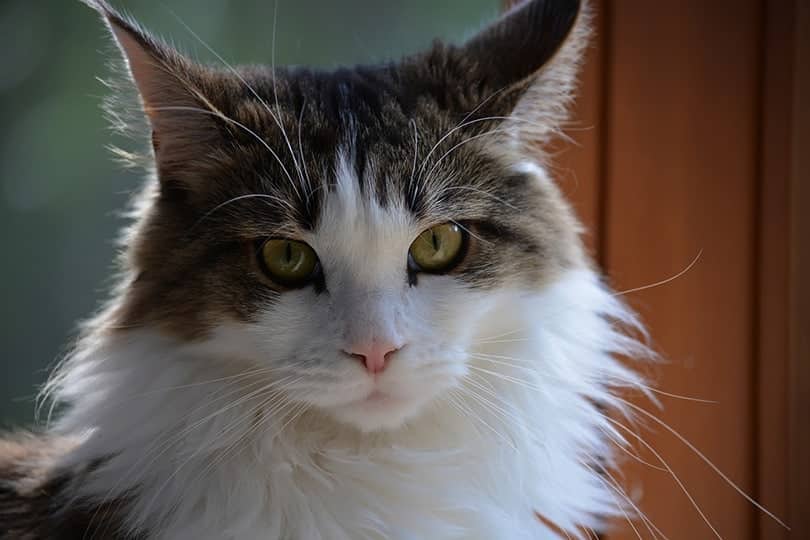

Things to Know When Owning a Maine Coon
Food & Diet Requirements 
Maine Coons are large cats, one of the largest domestic breeds in the world, and need a diet that can match their large size and high energy requirements. The most important ingredient is protein, especially for large breeds like the Maine Coon. Animal-based proteins are best, typically in the form of chicken, red meat, and fish, because they are far more easily absorbed and bioavailable to cats than vegetable sources. Cats are obligate carnivores, so animal-based protein should be the first listed ingredient in any food you feed them.
The food that you feed your Maine Coon should ideally be somewhat varied and free from grains like wheat, soy, and corn, all of which are not a natural part of a cat’s diet. Try and give them high-quality dry food and wet food for variation.
Maine Coons take time to mature fully, and due to their large size, they are often mistakenly over-fed. Especially in their early years, Maine Coons are particularly active animals that need a diet rich in nutrients and low in calories. Avoid foods with unnecessary filler ingredients to prevent them from becoming overweight or obese.
Exercise
The Maine Coon is a high-energy cat but doesn’t have any special exercise needs. A daily play session with toys of around 20-30 minutes is plenty for these cats, and even less time is needed if they spend a great deal of time outdoors. Cat trees and perches are great for them to play on and will stop them from mistakenly knocking over everything in your home!
Maine Coons love to play, arguably more so than most other breeds, so exercising them adequately should not be an issue. After short bursts of running around wildly, they will be happy to curl up and snooze on the sofa! Maine Coons are exceptionally trainable animals and can easily be trained to walk on a leash. A supervised walk around the neighborhood is also a great way to keep them adequately exercised.
Training
Maine Coons are one of the most trainable of all breeds and are quick to learn common commands. They are creatures of habit, so consistency is vital to training them well. Maine Coons can be trained to perform tricks almost as easily as many dog breeds. They are highly intelligent, love to spend time with their owners, and are fast learners.
Positive reinforcement training with treats is an ideal method to begin training with your Maine Coon. They love to impress, and they love treats, so being rewarded after successfully learning a command or trick is sure to cement the habit. Keep sessions short and make them as fun and entertaining as possible, and your Maine Coon will be trained in no time!

Grooming ✂️
Maine Coons have thick and long coats, so daily brushing is essential to keep them free from knots and matting. We recommend making this a regular habit from the day you bring your kitten home to get them used to it, but most Maine Coons will love the attention, anyway! Their coat is silkier in texture than many other long-haired breeds, so it doesn’t mat as quickly, but it still needs regular brushing. They tend to shed a fair bit, and regular brushing will help remove any dead hair.
These cats love water, so bathing shouldn’t be an issue. They’ll only need a bath once every couple of months, even less so if properly groomed.
Health and Conditions
Maine Coons have a relatively long lifespan of up to 15 years, but due to their large stature, they are susceptible to joint issues like hip dysplasia and arthritis. A good diet rich in healthy fats will go a long way in preventing these issues.
Spinal muscular atrophy (SMA) is also fairly common among Maine Coons and is a genetic condition that causes a loss of motor function in the lower spinal cord. Conscientious breeders typically screen for SMA, and although there is currently no cure, most cats can live relatively normal lives with the condition.
Hypertrophic cardiomyopathy is another genetic condition fairly common in Maine Coons and other breeds and typically leads to an enlarged heart.
- Obesity
- Asthma
- Diabetes
- Glaucoma
- Dermatitis
- Hip dysplasia
- Arthritis
- SMA
- Hypertrophic cardiomyopathy

Male vs. Female
In general, there are few differences between male and female Maine Coons. Males are generally slightly larger in size and personality, while females are smaller, slightly more reserved, and less playful. Males are more social and attention-demanding, while females are generally happier to keep to themselves.
These differences are, of course, largely anecdotal, and the opposite may be true of some Maine Coons. All cats are unique individuals that have unique personalities, and your Maine Coon’s temperament and personality will be far more affected by their upbringing and environment than their gender.

Final Thoughts
The Maine Coon is a great family pet with a large personality that matches their size. If you are looking for a cat that is more “dog-like” in personality, the Maine Coon fits the bill perfectly with its ease of trainability, affection, and intelligence. These cats are happy to be held, handled, and cuddled, making them great to live with children and other cats and dogs.
Maine Coons are large and have extensive grooming needs. If you are up to the task of daily brushing, loads of interaction, and tolerating your household items being knocked over, the Maine Coon is a great choice. They have long been a favorite breed among Americans, and that is unlikely to change anytime soon!
Related Read:
- Do Maine Coons Get Along with Dogs? What You Should Know
- Bengal Maine Coon Mix Cat Breed Info: Pictures, Temperament & Traits
Featured Image: Meriluxa, Shutterstock

